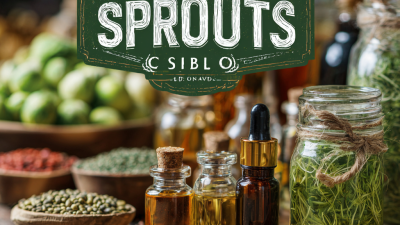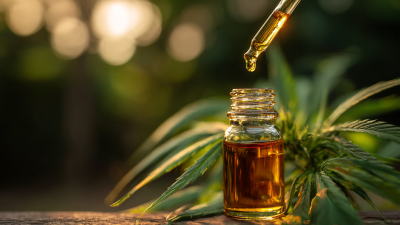As the wellness industry continues to evolve, the demand for natural alternatives to pharmaceuticals has surged, particularly for those seeking relief from chronic pain and stress. According to a report by Grand View Research, the global CBD market is projected to reach USD 47.2 billion by 2028, with a significant portion of this growth attributed to the rising interest in CBD derivatives. These compounds offer a myriad of potential health benefits, harnessing the therapeutic properties of cannabis without the psychoactive effects associated with THC. In this blog, we explore the seven best CBD derivatives that are gaining traction for enhanced wellness and pain relief, making it easier for individuals to incorporate these natural solutions into their daily routines. Whether you're a seasoned user or new to the world of CBD, understanding these derivatives can empower your journey towards improved health and well-being.

Cannabidiol (CBD) has gained significant attention in the wellness industry due to its potential benefits and versatility. As a non-psychoactive compound found in cannabis, CBD derivatives are increasingly being explored for their ability to enhance overall wellness and provide pain relief. Research suggests that these derivatives may work by interacting with the body's endocannabinoid system, which plays a crucial role in regulating mood, sleep, pain, and immune response. With various forms of CBD available—such as oils, gummies, and topical creams—individuals are finding effective methods to incorporate these products into their daily routines for improved health outcomes.
The science behind CBD's efficacy continues to evolve, revealing promising uses in managing chronic pain, anxiety, and inflammation. Clinical studies have indicated that CBD may help reduce discomfort and promote relaxation without the side effects often associated with traditional medications. However, as the market expands, consumers should remain informed about the products they choose, particularly in light of regulatory discussions surrounding CBD and its use in food and beverages. Understanding the available options and their potential impacts can empower individuals to make informed decisions about integrating CBD derivatives into their wellness practices.
In recent years, CBD derivatives have gained immense popularity for their potential benefits in pain management and overall wellness. Among the countless options available, certain derivatives stand out for their effectiveness. For instance, CBD oils and tinctures are frequently recommended due to their easy absorption and versatility in usage. They can be taken sublingually or added to foods and beverages, providing a convenient way to incorporate CBD into daily routines.
Another noteworthy derivative is CBD balm or topical cream, particularly prized for localized relief. When applied directly to the skin, these products target specific pain points, making them ideal for muscle soreness, joint pain, or inflammation. Additionally, CBD gummies offer a delicious and discreet way to experience the benefits of CBD, particularly for those who prefer a sweet treat while addressing pain or anxiety.
Each of these CBD derivatives brings something unique to the table, catering to different needs and preferences. As research continues to unveil the potential therapeutic properties of CBD, exploring these top derivatives can be a beneficial step towards achieving improved wellness and effective pain relief.
| CBD Derivative | Primary Benefits | Usage | Effectiveness | Forms Available |
|---|---|---|---|---|
| CBD Oil | Pain Relief, Anxiety Reduction | Sublingual, Topical | Highly Effective | Tinctures, Capsules |
| CBD Isolate | Purest Form of CBD | Add to Foods, Sublingual | Effective for Specific Needs | Powder, Crystals |
| CBD Gummies | Convenient, Tasty Method | Oral Consumption | Moderately Effective | Gummies, Chews |
| CBD Topicals | Localized Pain Relief | Apply Directly to Skin | Highly Effective | Creams, Salves |
| Full-Spectrum CBD | Entourage Effect | Sublingual, Edibles | Highly Effective | Oils, Capsules |
| Broad-Spectrum CBD | THC-Free with Cannabinoids | Sublingual, Edibles | Very Effective | Oils, Gummies |
| CBD Vapes | Fast-Acting Relief | Inhalation | Very Effective | Cartridges, Pens |
The growing interest in cannabinoids, particularly in relation to mental health, underscores their potential in stress reduction and enhancing mental clarity. According to a report by the World Health Organization, cannabinoids like CBD have shown promise in alleviating symptoms of anxiety disorders. In a 2019 study published in the Journal of Clinical Psychology, 79% of participants experienced a significant reduction in anxiety levels after using CBD, highlighting its efficacy as a potential therapeutic approach.
Moreover, research conducted by the Global Drug Survey reported that 66% of CBD users reported improved sleep quality and reduced feelings of stress. By interacting with the endocannabinoid system, cannabinoids can help balance the body's response to stress, contributing to an overall sense of wellbeing. The neuroprotective properties of cannabinoids also promote cognitive functions, assisting in mental clarity and focus. As the body of research around cannabinoids expands, their role in mental health continues to gain recognition as a viable option for those seeking natural relief from stress-related challenges.
When it comes to utilizing CBD derivatives for enhanced wellness and pain relief, understanding proper dosage is crucial for achieving the best results. Many individuals make the mistake of assuming that more is always better, but dosage can vary significantly based on factors such as body weight, metabolism, and the specific condition being addressed. Starting with a low dose and gradually adjusting based on personal response is often the best approach. For instance, beginners might consider starting with something like 5-10 mg of a CBD derivative and monitor how their body reacts over several days.
For those seeking optimal relief, it's essential to tailor the dosage to meet individual needs. Different CBD derivatives, such as oils, edibles, and topicals, can have varying levels of potency. While oils may allow for more precise dosing, edibles can provide longer-lasting effects. It’s also advisable to consult with a healthcare professional who understands CBD to establish a regimen that is not only effective but safe. By paying attention to your body's signals and adjusting dosages accordingly, you can maximize the benefits of CBD derivatives on your wellness journey.

The future of CBD is shaped by emerging trends and innovations that promise to transform wellness and pain relief solutions. As the global CBD market is projected to reach $13.4 billion by 2028, a significant increase from $4.6 billion in 2023, industry experts highlight a growing focus on enhanced bioavailability and targeted delivery systems. This trend is paving the way for sophisticated formulations that maximize the therapeutic potential of CBD, ensuring that consumers receive optimal benefits for both chronic pain management and overall well-being.

In addition to advancements in formulation technologies, the integration of CBD into everyday wellness products is on the rise. From infused beverages to topical treatments, companies are exploring diverse applications, driven by consumer demand for holistic approaches to health. A recent report indicated that 52% of consumers are more likely to purchase products containing CBD due to its perceived health benefits, illustrating the shift towards preventive wellness strategies.
Tips: When considering a CBD product, look for those featuring third-party lab testing to ensure quality and potency. Additionally, consult with a healthcare professional to tailor a CBD regimen that aligns with your personal health goals, especially if you're exploring CBD for pain relief. Lastly, keep an eye on emerging products; innovations in nanoemulsion technology can significantly improve absorption rates, maximizing the efficacy of CBD in your wellness routine.







